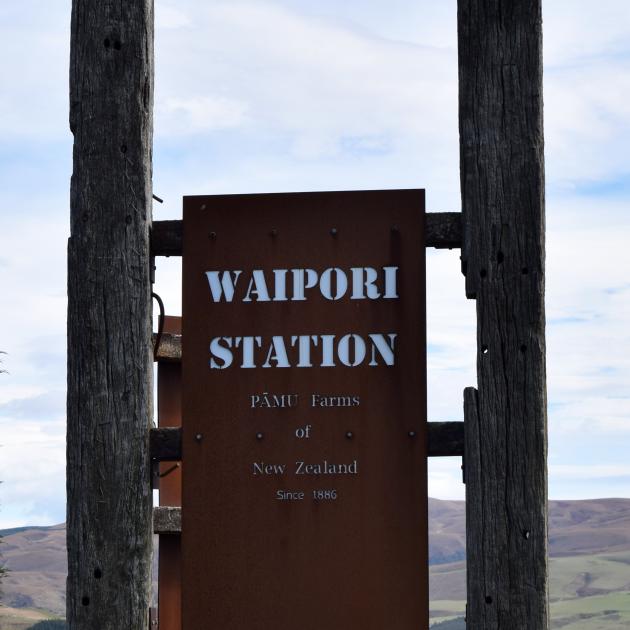
He was appointed as the Waipori Station farm manager last month.
The more than 12,500ha sheep and beef station running 57,000 stock units was a cool place to live and work, he said.
"It is vast country."
Born and raised on a lifestyle block in Whanganui, Mr Lee liked the idea of being a shepherd.
He left school aged 15 to realise his dream, securing shepherd work at farms in South Otago, including Beaumont Station, for about four years.
After a stint stock-managing on a farm in Middlemarch, he began working as head shepherd on Waipori Station for state-owned enterprise Pāmu Landcorp in 2012.
During his five years at Waipori Station, he progressed to stock manager and then a second-in-charge role.
He left Waipori Station to work in a management role on Cabbage Tree Flat Station in Waimarama, Hawke’s Bay for three years.
When Cabbage Tree Flat Station was sold, he co-founded a fencing contracting business in North Canterbury and worked in it for a year.
"We built a successful business."
When he and his wife were expecting their second child, he wanted to be home more and returned to farming on another privately owned sheep and beef farm in North Canterbury.
Another opportunity to finish about 50,000 lambs a year spurred a return to Hawke’s Bay, this time south of Hastings.
"That was good fun — super intensive and a lot going on."

"I was real keen to have a crack at it because I always wanted to back in the day but I didn’t have the experience at the time."
His wife hailed from Lawrence, so it was an easy sell to return to Otago.
"It is home for my wife and it is home for me."
He enjoyed working with people and the new role allowed him work with a dozen staff.
Working on a smaller farm would rob him of an opportunity to work with a lot of people, which was why he had never chased farm ownership.
"I don’t think farm ownership would fulfil me in the way I need."
Sheep and beef farm ownership "from zero" was still achievable but required plenty of hard work, good decisions and sacrifice.
He had been offered two equity partnership deals in the past but declined both.
A farm management role suited his lifestyle including fishing and hunting and raising a family on farm.
Often a large corporate company, such as Pāmu, could offer more opportunities than working on a smaller privately owned farm.
New technology and health and safety initiatives were often trialled on Pāmu farms.
"It is a guinea pig."
Often health and safety protocols, such as providing helmets for staff on quad bikes, was an initiative on Pāmu farms before it came a national directive.
"Pāmu are hot on health and safety so a lot of time you are on the forefront of it."
People often lamented health and safety protocol but it was there to make sure everyone made it home safe each day.
All the farm equipment provided to Pāmu staff was top-notch.
"You’re never riding around on an old buggered four-wheeler with bald tyres; you can be sure the equipment that you have is up to scratch. Which is a good thing: if you don’t have to deal with average gear, it makes things a lot easier."
Although the standard of the equipment and homes provided to farm staff was higher than those offered in the private sector, it was more a case of being fit-for-purpose rather than luxury.
‘‘It is good gear.’’
Holly Landreth was recently promoted to farm manager on neighbouring Pamu property Thornicroft Station in Waipori.
She began working for the Crown-owned company as a stock manager on the more than 3000ha sheep, beef and deer station in mid 2022.
Born and raised on a beef and deer farm in Haast on the West Coast, she would eventually return home to farm but wanted to work for other people to gain a range of skills.
‘‘If you go straight home, you just do what dad did and you don’t learn as much as you probably could.’’
After studying a for a bachelor of commerce in agriculture at Lincoln University, she worked as a shepherd at Lone Star Farms’ sheep and beef property The Wandle near Middlemarch for five years.
The Wandle provided an opportunity to gain experience at a large breeding and finishing operation.
She applied for the stock manager role on Thornicroft because she was ready to ‘‘step up’’.
A major difference between the stock manager and farm manager roles was the latter featured more office work.
Staff on Thornicroft included herself and three shepherds and a tractor driver.
The start of spring on Thornicroft had been cold, wet and windy.
More than 7cm of snow fell earlier this month but was early enough in the season to limit any lamb deaths.
When the heat arrived, the pasture would grow and need to be managed.
‘‘We’ll be trying to control it.’’
About 10km by road separates the two main offices on Waipori and Thornicroft stations.
Although both stations were in the same area, they mostly worked as separate entities.
An exception during her tenure included 300 cows being moved from Waipori to Thornicroft to utilise some feed about two winters ago, she said.
She enjoyed working in the rolling terrain on Thornicroft.
‘‘It is perfect.’’












